Shooting haute couture is a privilege and a rare occasion. The haute couture in Paris only shows for four days, and one of those days is to exhibit Haute Joaillerie (jewelry). The weekend of July 7-8 was the first time I ever shot two different haute couture shoots back-to-back with two different magazines. To say it was controlled would be pretty much accurate. It is a lot simpler to be in a completely controlled environment, i.e., a studio where the lights are set up and ready to go, and the model steps in once the stylist has prepared the look. But, we didn’t shoot in a controlled studio; we shot in two separate locations with two widely different themes.
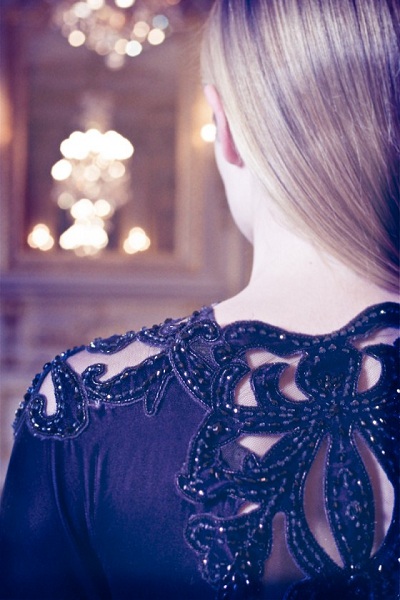
© Benjamin Kanarek
The haute couture process
If you know anything about the haute couture shooting process, you’ll understand that it’s absolute insanity. Those poor overworked press attaches, messengers, stylists and assistant stylists (where would the stylist be without them?). For the whole team, it is an insane roller coaster ride that only the brave should consider embarking on. You see, when we do a ready-to-wear shoot, the stylist has the luxury of having the clothing for the whole day of the shoot and can take his time to develop each look, mixing and matching the different designers as they please to get the desired effect they are after. But, there’s no such luxury in Haute Couture. Being that there are very few looks in the Haute Couture and only certain magazines are given the privilege to shoot and catalogue the few designers who create those pieces of art, there is a very specific pecking order of which magazine gets what and when.
Most of the major magazines (like Vogue, Harper’s BAZAAR, Numero, W, etc.) are given priority in this pecking order and get to pick the primary looks before anyone else can. So, you have to imagine what happens just after the show ends. Let’s say we have ten of the majors and ten of the lesser-known magazines shooting in Paris, and here is what will happen. The couture house PR people receive the requests from the magazine stylists, and the PR rep has to determine who will get what, when or not at all. The PR will contact the stylists to tell them if their request can be approved; if it’s denied, the PR will suggest alternatives or will just say, “This is all we have available, do you want this look?” In most cases, the fashion stylist will get what they requested, especially for the larger magazines.
Time is limited and planning is crucial for success
The teams now have to play the waiting game, as well as schedule and choreograph their shoots with the knowledge of what time their look will arrive and when it has to be released (so another team somewhere else in Paris may get it for their own production). Often, PR people will come with the clothes to the shoot, to make sure they get it back directly and deliver it to the next shoot. If you cannot get the shot done in time with the designer you wish to feature, tough luck, you won’t be able to get it back. The planning is crucial. The classic line I’m so accustomed to hearing from the stylist is, “Ben, we have to shoot his dress now, they are picking it up in thirty minutes…” or even worse, which we did experience, “The messenger is here now. You have to shoot it now!” We had one guy who was a gem. He came to pick up a very important designer and we hadn’t yet shot the dress. He said, “Look, I have to go to a studio to pick up several dresses of the same designer, so that gives you at least another hour or so, will that do?” We thanked him profusely and went on to get the shot.
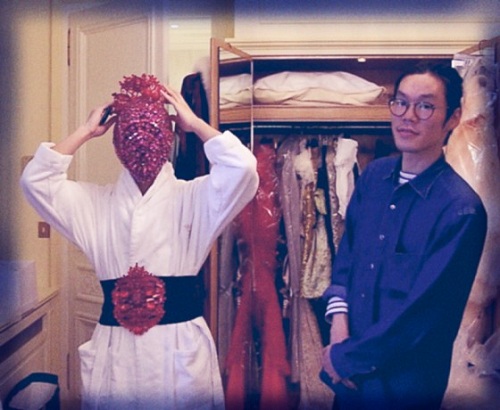
Eric Waroll wearing the Maison Martin Margiela Mask with Stylist Sohei Yoshida; © Frédérique Renaut
Working in the lap of luxury
The aforementioned shooting process went on for each day we shot. We did our shoots in two very luxurious hotels. That complicated matters as the messengers had to go through a rather lengthy process to have access to our suites. On the first day, we shot at the Hotel Shangri-la, and on the second at the Hotel de Crillon. Both provided services fit for a king or queen. As a result, our control centers were the suites provided by the hotel. Both were of the presidential category. The hair, make-up and styling were done in the bedrooms of the suites. When a messenger or PR person would arrive, they’d present themselves to the concierge, and be accompanied to the elevator and to our suite (a long and tedious process). They would present the stylist assistant the dress and the assistant would sign for it. The messenger or PR representative would then leave. In a few cases, the PR person would stay for the shoot, until we photographed their look. That was the case for Givenchy, for example. When the messenger returned, the process was the same. The stylist would sign the release and off the messenger would go to another shoot or back to the Couture House.
Frequently the messenger would show up while we were shooting and they’d have to wait in the control center until we finished. Generally, never more than fifteen minutes per shot. We would shoot in several different locations of the hotel. On our second day, we shot on the street, in front of the Hotel de Crillon, Place de la Concorde and Jardin de Tuileries. That is even more problematic, especially with haute couture, with pieces that can run as high as $250,000 per piece or even higher. That particular part of the process was kind of fun, with all of the tourists lined up with their iPhone’s, tweeting away and sending off images to whomever would be privy to their experience. It was funny on the second day for our other shoot, as it was quite chilly for July; most of the crew wore Hotel de Crillon bathrobes on the streets of Paris. We looked like sanitarium patients who had escaped and were on the loose! The other shoot we did was approximately half interiors and half exterior.
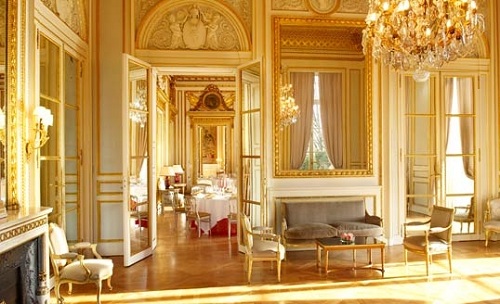
Salon Marie Antoinette Hotel de Crillon
What a team!
The Harper’s BAZAAR images were all done as interior location themes at the Shangri-la Hotel. We really wanted to differentiate the two shoots, which was a bit challenging as they were both done in Palace Hotels. Thus shooting outdoors on the second day was a great way to add to the variety of the themes. We didn’t want the Harper’s BAZAAR shoot to look like our other haute couture shoot. Each magazine deserves an exclusive and unique perspective. What’s incredible is that, at least from the standpoint of the team, we only used one model per day. We also were able to shoot fourteen pages for Harper’s BAZAAR and about the same for our other fashion shoot. We commenced each day at 8:30 a.m. and finished around 8:00 p.m. Not only did we do the shoot, but Frédérique filmed them both and we also did interviews with the models and some members of the team. All in all, it was a very fulfilling day!
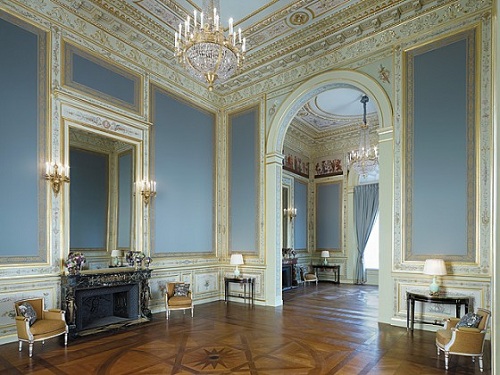
Hotel Shangri-la Salon Historique
It was a very hectic weekend, but I feel privileged to have been part of the experience. Some of the designers we were able to shoot were Armani, Dior, Chanel, Givenchy, Jean Paul Gaultier, Versace, Valentino, Alexandre Vauthier, Maison Martin Margiela, Giambattista Valli, Jan Taminiau and Elie Saa.
We had a great team for the two days. I wish to thank our wonderful Fashion Editor Sohei Yoshida, his fabulously fashionable assistant and fashion editor Eric Waroll. Thanks to Makeup Artist Angélik Iffennecker and Hair Stylist Patrice Delaroche and all of the other assistants to the crew, whom I will give honorable mention once the editorials have come out. Thanks to Paul-Antoine Goutal, my assistant for aiding in these shoots and, of course, Frédérique Renaut, with whom I could not have done any of this had she worked with us. Of course, I mustn’t forget Amy Verner, the Globe and Mail journalist covering the story. Also, thanks to Harper’s BAZAAR for giving me the opportunity to cover haute couture, and the Hotel de Crillon and the Shangri-la Hotel communications crew for making this happen with elegant panache.
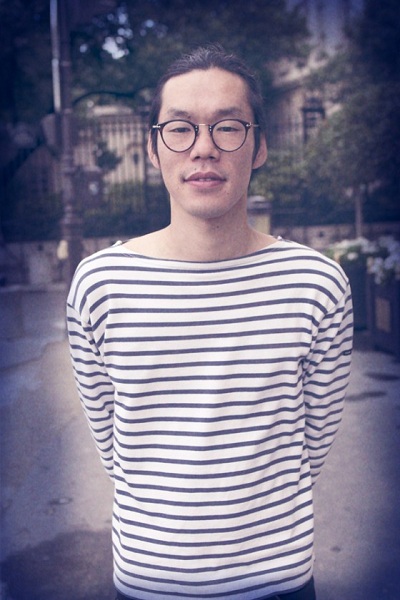
Fashion stylist: Sohei Yoshida; © Benjamin Kanarek
This article is republished from Benjamin Kanarek’s blog.

© Benjamin Kanarek
The haute couture process
If you know anything about the haute couture shooting process, you’ll understand that it’s absolute insanity. Those poor overworked press attaches, messengers, stylists and assistant stylists (where would the stylist be without them?). For the whole team, it is an insane roller coaster ride that only the brave should consider embarking on. You see, when we do a ready-to-wear shoot, the stylist has the luxury of having the clothing for the whole day of the shoot and can take his time to develop each look, mixing and matching the different designers as they please to get the desired effect they are after. But, there’s no such luxury in Haute Couture. Being that there are very few looks in the Haute Couture and only certain magazines are given the privilege to shoot and catalogue the few designers who create those pieces of art, there is a very specific pecking order of which magazine gets what and when.
Most of the major magazines (like Vogue, Harper’s BAZAAR, Numero, W, etc.) are given priority in this pecking order and get to pick the primary looks before anyone else can. So, you have to imagine what happens just after the show ends. Let’s say we have ten of the majors and ten of the lesser-known magazines shooting in Paris, and here is what will happen. The couture house PR people receive the requests from the magazine stylists, and the PR rep has to determine who will get what, when or not at all. The PR will contact the stylists to tell them if their request can be approved; if it’s denied, the PR will suggest alternatives or will just say, “This is all we have available, do you want this look?” In most cases, the fashion stylist will get what they requested, especially for the larger magazines.
Time is limited and planning is crucial for success
The teams now have to play the waiting game, as well as schedule and choreograph their shoots with the knowledge of what time their look will arrive and when it has to be released (so another team somewhere else in Paris may get it for their own production). Often, PR people will come with the clothes to the shoot, to make sure they get it back directly and deliver it to the next shoot. If you cannot get the shot done in time with the designer you wish to feature, tough luck, you won’t be able to get it back. The planning is crucial. The classic line I’m so accustomed to hearing from the stylist is, “Ben, we have to shoot his dress now, they are picking it up in thirty minutes…” or even worse, which we did experience, “The messenger is here now. You have to shoot it now!” We had one guy who was a gem. He came to pick up a very important designer and we hadn’t yet shot the dress. He said, “Look, I have to go to a studio to pick up several dresses of the same designer, so that gives you at least another hour or so, will that do?” We thanked him profusely and went on to get the shot.

Eric Waroll wearing the Maison Martin Margiela Mask with Stylist Sohei Yoshida; © Frédérique Renaut
Working in the lap of luxury
The aforementioned shooting process went on for each day we shot. We did our shoots in two very luxurious hotels. That complicated matters as the messengers had to go through a rather lengthy process to have access to our suites. On the first day, we shot at the Hotel Shangri-la, and on the second at the Hotel de Crillon. Both provided services fit for a king or queen. As a result, our control centers were the suites provided by the hotel. Both were of the presidential category. The hair, make-up and styling were done in the bedrooms of the suites. When a messenger or PR person would arrive, they’d present themselves to the concierge, and be accompanied to the elevator and to our suite (a long and tedious process). They would present the stylist assistant the dress and the assistant would sign for it. The messenger or PR representative would then leave. In a few cases, the PR person would stay for the shoot, until we photographed their look. That was the case for Givenchy, for example. When the messenger returned, the process was the same. The stylist would sign the release and off the messenger would go to another shoot or back to the Couture House.
Frequently the messenger would show up while we were shooting and they’d have to wait in the control center until we finished. Generally, never more than fifteen minutes per shot. We would shoot in several different locations of the hotel. On our second day, we shot on the street, in front of the Hotel de Crillon, Place de la Concorde and Jardin de Tuileries. That is even more problematic, especially with haute couture, with pieces that can run as high as $250,000 per piece or even higher. That particular part of the process was kind of fun, with all of the tourists lined up with their iPhone’s, tweeting away and sending off images to whomever would be privy to their experience. It was funny on the second day for our other shoot, as it was quite chilly for July; most of the crew wore Hotel de Crillon bathrobes on the streets of Paris. We looked like sanitarium patients who had escaped and were on the loose! The other shoot we did was approximately half interiors and half exterior.

Salon Marie Antoinette Hotel de Crillon
What a team!
The Harper’s BAZAAR images were all done as interior location themes at the Shangri-la Hotel. We really wanted to differentiate the two shoots, which was a bit challenging as they were both done in Palace Hotels. Thus shooting outdoors on the second day was a great way to add to the variety of the themes. We didn’t want the Harper’s BAZAAR shoot to look like our other haute couture shoot. Each magazine deserves an exclusive and unique perspective. What’s incredible is that, at least from the standpoint of the team, we only used one model per day. We also were able to shoot fourteen pages for Harper’s BAZAAR and about the same for our other fashion shoot. We commenced each day at 8:30 a.m. and finished around 8:00 p.m. Not only did we do the shoot, but Frédérique filmed them both and we also did interviews with the models and some members of the team. All in all, it was a very fulfilling day!

Hotel Shangri-la Salon Historique
It was a very hectic weekend, but I feel privileged to have been part of the experience. Some of the designers we were able to shoot were Armani, Dior, Chanel, Givenchy, Jean Paul Gaultier, Versace, Valentino, Alexandre Vauthier, Maison Martin Margiela, Giambattista Valli, Jan Taminiau and Elie Saa.
We had a great team for the two days. I wish to thank our wonderful Fashion Editor Sohei Yoshida, his fabulously fashionable assistant and fashion editor Eric Waroll. Thanks to Makeup Artist Angélik Iffennecker and Hair Stylist Patrice Delaroche and all of the other assistants to the crew, whom I will give honorable mention once the editorials have come out. Thanks to Paul-Antoine Goutal, my assistant for aiding in these shoots and, of course, Frédérique Renaut, with whom I could not have done any of this had she worked with us. Of course, I mustn’t forget Amy Verner, the Globe and Mail journalist covering the story. Also, thanks to Harper’s BAZAAR for giving me the opportunity to cover haute couture, and the Hotel de Crillon and the Shangri-la Hotel communications crew for making this happen with elegant panache.

Fashion stylist: Sohei Yoshida; © Benjamin Kanarek
This article is republished from Benjamin Kanarek’s blog.
No comments:
Post a Comment